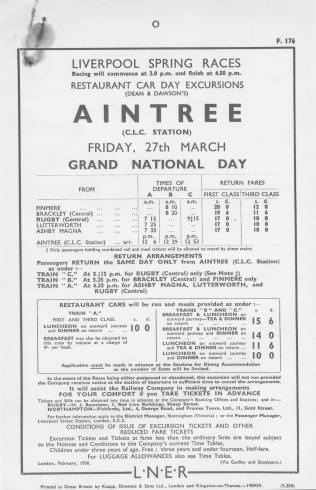
The Finmere Record
The Finmere Record
SATURDAY, 30 MARCH 2002

A chance purchase over the Internet provided the impetus for the first part of this newsletter. In the twenty-first century, we need to travel to Milton Keynes or Bicester to catch a train. In 1936, the parish had a choice of stations. The London and North Western Railway (LNWR) ran through the north of the parish with a halt at Bacon’s House and a station at Fulwell and Westbury. The London and North Eastern Railway (LNER) ran though the south and west of the parish, with a station ‘Finmere for Buckingham’ at Shelswell. From that station, villagers could quickly travel to London and the north, including to Aintree. To complete this occasional edition of the Finmere Record, we return to a popular topic of discussion, the weather, which in 1881 stopped the trains.
Andy Boddington, March 2002
Red Rum is famous for winning the gruelling four-and-a-half mile Grand National chase three times: in 1973, 1974 and 1977. On the second occasion he passed the winners post, he was the first to achieve the double since Irish-bred Reynoldstown in 1935 and 1936. The advertisement pictured left suggests that many Finmere residents travelled to see Reynoldstown’s second victory on a special train that started at Finmere Station.
Reynoldstown was owned and trained by the suitably named Major Noel Furlong. In 1936, Jockey Fulke Walwyn rode the nine-year-old horse to victory in 9 minutes 37 seconds against 35 runners. Punters who backed Reynoldstown would have made a handsome return at the starting price of 10 to 1.
The train left Finmere at 8.10am and arrived at Aintree near Liverpool, 4 hours 20 minutes later, after picking up extra passengers at Brackley. The cost was 12 shillings third class (£30 today) and one pound first class (£50). Breakfast, luncheon and dinner were served in the restaurant car for 15s 6d (£39).
The excursion was organised by Dean & Dawson, travel agents for LNER. The LNER line through Finmere was constructed as part of the Great Central railway, which opened in 1899. The Great Central became concerned about competition from the Midland Railway, which was working with agents Thomas Cook & Son. To compete, it purchased Dean & Dawson, a travel company set up in 1871. The driving force was Joseph Dean, who had merged his business with Dawson’s around 1880, and the company continued to operate under its own name while part of LNER.
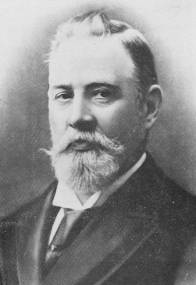
Joseph Dean.
It is said that this respected Yorkshireman never shaved in his life.
The Great Escape
On the night of 24th March 1944, over 200 Allied aircrew attempted to break out of Stalag Luft III, a prisoner of war camp in eastern Germany. This escape was immortalised in the film, The Great Escape. The forgers who made the travel papers and passes for escapees, led by Donald Pleasance in the film, were known as Dean & Dawson, after the travel agency.
The photographs below were taken just before New Year 2001,
120 years after the Great Snow Storm
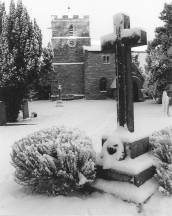 As our winters become warmer and the weather more turbulent, major snowstorms are becoming rarer in the south of England. But storms once had a major effect on village life. In January 1881, for example, the school log book notes:
As our winters become warmer and the weather more turbulent, major snowstorms are becoming rarer in the south of England. But storms once had a major effect on village life. In January 1881, for example, the school log book notes:
School work carried on in the normal way on Monday and Tuesday; only 19 children attended on Wednesday morning (owing to a heavy fall of snow)… School closed… Only 20 children present, school closed. Friday, attendance much better.
This report underplayed the meteorological drama of the week and we need to turn to the Buckingham Advertiser of 22 January to discover more about ‘The Great Snow Storm’:
‘Snow’d out.’ This term, or rather ‘snow’s in’ has not been realised in England for many years; but really, during the past week, it has been felt to an unmerciful extent in Buckingham and the district.
On Friday and Saturday a hard frost set in, and on Sunday and Monday, lovers of the ice found plenty of scope for skating on the canal, and hundreds availed themselves for an indulgence in the healthy sport.
On Tuesday, however, a strong gale blew from the north-east, with terrible effect, tearing off limbs from trees, loose tiles from house-tops, and otherwise doing considerable injury.
Fortunately, the Rector of Water Stratford had not retired to bed when a chimney fell through the roof of his rectory breaking the bedstead. As the day went on, the blizzard worsened:
As evening approached, the gale again freshened until it was utterly impossible to travel the street on foot with anything like safety. The small snow flakes, more resembling ice peas, blinded pedestrians and were frozen to the face and garments as they fell.
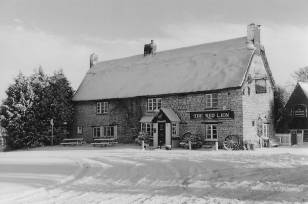
The trains through Buckingham were soon blocked in by the snowfall, trapping many people, including guests at a Labour Loan Society supper at the Grand Junction in Buckingham. Some revellers tried to reach home but became stuck on the Bourton and Padbury roads.
At mid-night a batch of men were dispatched to relieve the snow’d in parties, who were brought back to Buckingham for safety for the night.
The next day, Wednesday, was no better. Gangs of men were dispatched to dig out a Banbury to Buckingham train which had become stuck near Brackley the night before, and travel by road and rail remained impossible.
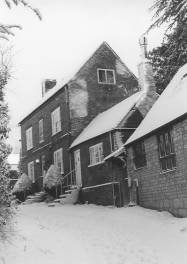 In the town… our energetic surveyor, Mr RW Monday had employed a large number of men to clearing the paths and roads, and diggings cuttings through the snow drifts… Foot messengers occasionally appeared with a piteous tale from the rural parishes. Hedges and gates were covered and the valleys on the roads were filled in ten to twelve feet deep.
In the town… our energetic surveyor, Mr RW Monday had employed a large number of men to clearing the paths and roads, and diggings cuttings through the snow drifts… Foot messengers occasionally appeared with a piteous tale from the rural parishes. Hedges and gates were covered and the valleys on the roads were filled in ten to twelve feet deep.
One pauper had an unfortunate journey to his grave. Early on the Wednesday, despite the appalling weather, the Master of the Union Workhouse had dispatched a porter with a hearse and a corpse for burial at Edgcott. The hearse became stuck at Three Bridge Mill and was only with difficulty manoeuvred off the bridge to the Three Bridge Inn, where it remained in the care of the landlord until the weather improved.
Such occasions allowed the Buckingham Advertiser’s correspondent opportunity for colourful heroic prose.
All trade was therefore suspended and the white snow still continued to fall, the gentle sparking flakes kissing the cheek as though in silent memory of man’s puny powers… No trains arrived and the letters posted on Tuesday remained at the post-office, and [people] could well imagine the discomfort of Buckinghamites, who were a day without letters and news. But such was the case, and no tidings were arriving as to when the snow-beleaguered garrison on Buckingham was to be relieved from its unenviable position.
At length, relief came, the at other times shrill but now welcome whistle of the engine as it rang in the frosty air through the town, announcing that the train had been relieved and was at the station… The town generally appeared to feel a sense of relief that the railway traffic was again open.
This is the seventh in an occasional series of the Finmere Record.
Thanks to Mike Hammond for information on Dean and Dawson.